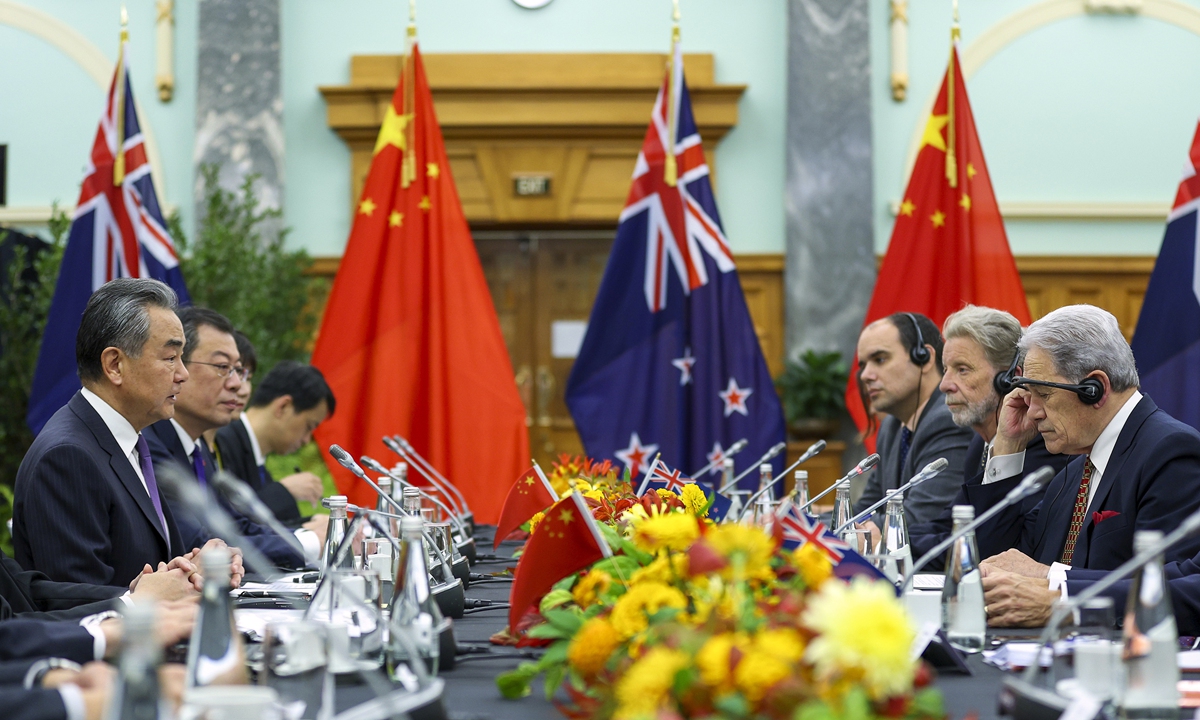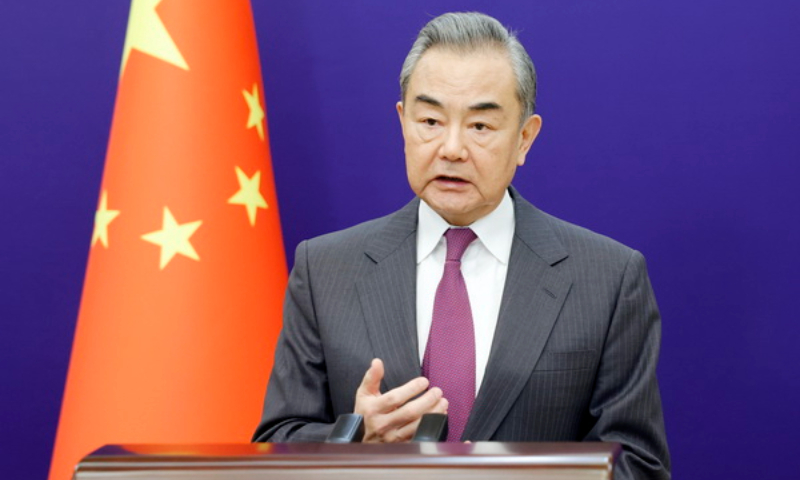Chinese FM hails China-New Zealand ties during visit
Productive relations with China and staying away from US chessboard vital for Wellington

Chinese Foreign Minister Wang Yi (left) meets with New Zealand Deputy Prime Minister and Minister of Foreign Affairs Winston Peters (right) in Wellington on March 18, 2024. Photo: VCG
Visiting Chinese Foreign Minister Wang Yi met with New Zealand prime minister and foreign minister on Monday, where he acknowledged that two sides have set many "first" records, making bilateral relations always at the forefront of China's relations with developed countries, and becoming a valuable asset for both sides to cherish and carry forward.
Wang said during his meeting with New Zealand Prime Minister Christopher Luxon that China regards New Zealand as a rational and mature cooperative partner, and China-New Zealand relations are of a strategic and long-term nature, according to the statement published by the Chinese Foreign Ministry.
We are ready to take the opportunity of celebrating the 10th anniversary of our comprehensive strategic partnership with New Zealand to transcend new benchmarks, upgrade our comprehensive strategic partnership, and build relations between countries that are harmonious but different, so as to benefit our two peoples and make new contributions to world peace and development, Wang stated.
China is ready to work with New Zealand to strengthen solidarity and cooperation, resist a Cold War mentality, unilateralism and protectionism, oppose reversing the course of history and safeguard the right direction of human progress, the senior Chinese diplomat said.
The Chinese economy enjoys both a solid foundation and a broad space for growth, which will continue to inject more impetus into the world economy and bring new opportunities to New Zealand, the Chinese foreign minister said.
Before his meeting with New Zealand's Deputy Prime Minister and Foreign Minister Winston Peters, Wang said in the capital Wellington that in the face of the current tumultuous international situation, China is willing to strengthen strategic communication with friends in New Zealand on international and regional issues of common concern.
Given that the trip marks the start of a diplomatic blitz through New Zealand and Australia, Wang's first visit to either country since 2017, Chinese observers believe that in the trip, the senior Chinese diplomat first visits New Zealand and then Australia demonstrates the significance China attaches to its ties with New Zealand.
Meanwhile, the Chinese Ambassador to New Zealand Wang Xiaolong, in an exclusive written interview with the Global Times, said that through this visit, China hopes to work with New Zealand to implement the consensus reached by the leaders of the two countries, strengthen strategic communication, enhance political mutual trust, expand practical cooperation, jointly promote the steady and lasting development of China-New Zealand comprehensive strategic partnership, and make positive contributions to world peace, stability, development and prosperity. The ambassador noted that both sides attach great importance to this visit.
The Chinese Foreign Ministry also revealed that Wang Yi and Peters discussed trade, business and security in the Pacific as well as "areas of difference" including human rights and the situation in Xinjiang, Hong Kong and Xizang.
"We also highlighted New Zealand and China's shared interest in a secure and prosperous Indo-Pacific region and raised concerns over increased tensions in the South China Sea and Taiwan Straits," according to a statement issued by Peters following the meeting.
Chen Hong, executive director of Asia Pacific Studies Centre at East China Normal University, urged Wellington to refrain from joining Washington in provoking key issues related to China especially on the Taiwan question as the resolution of the Taiwan question is a matter for the Chinese.
While a continuous stable development of China-New Zealand ties is under anticipation, Chen warned that the US and some of its allies would try to further instigate tensions and woo New Zealand to follow its anti-China strategy.
The New Zealand Herald pointed out in its latest article on Monday that "from China's perspective, this week's visit by its foreign minister to New Zealand could be coming at just the right moment" as Wellington's "potential wavering over AUKUS is an opportunity" for "Beijing to make its case to Wellington."
In New Zealand itself, opposition to the country joining the AUKUS deal also appears to be increasing in intensity.
Many key voices including politicians and businessmen in the Pacific country urged the coalition government to think twice as they pointed out that AUKUS is offensive warfighting alliance against China, and joining such a deal would harm New Zealand's national interests.
China has been New Zealand's biggest two-way trading partner since 2017. Indeed, 10 years ago, the signing of a comprehensive strategic partnership between China and New Zealand marked the start of glory days for bilateral trade.
For New Zealand, economic issues are critical, so maintaining productive and constructive relationships with China rather than putting itself on the strategic chessboard of the US is vital for the South Pacific country, Chen stressed.


